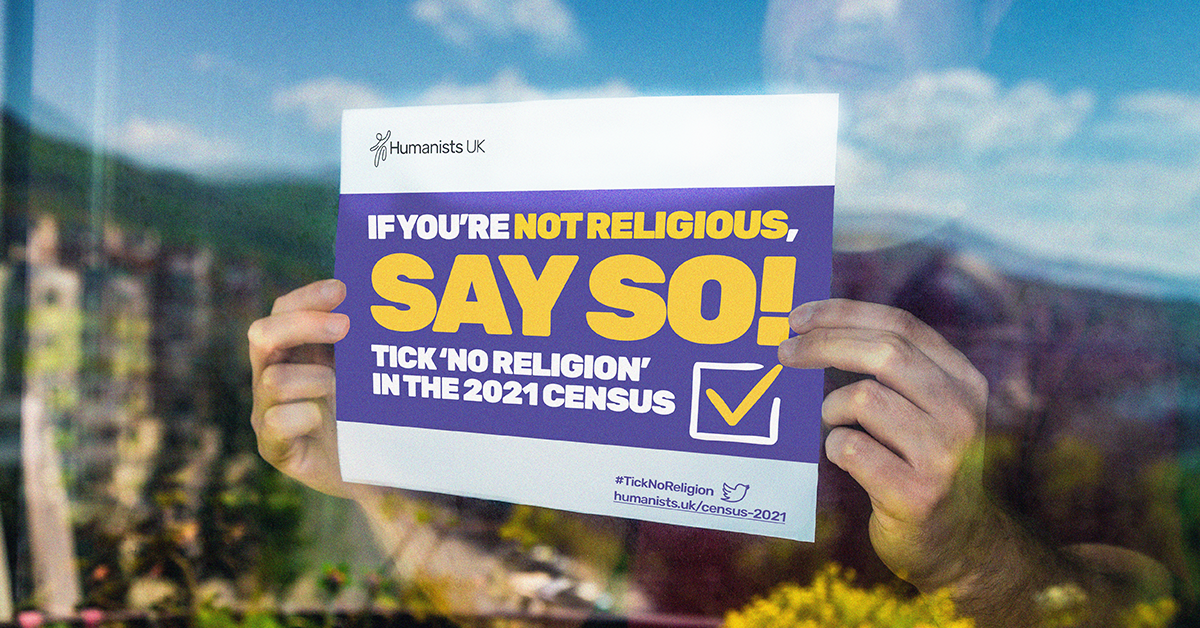
Humanists UK has raised concerns to the Office of National Statistics (ONS) about how the Census fails to accurately capture the non-religious population. This inaccuracy negatively impacts a number of public services including selective faith school admissions, SACRE membership, pastoral care provisions in hospitals, prisons and the Armed Forces, and discriminatory partnerships with places of worship and community groups. The ONS has proposed plans to improve the way statistics are produced across a wide range of areas. In its response to a consultation on this proposal, Humanists UK highlighted that plans to improve data collection on religion or belief are underdeveloped.
The problem with ‘What is your religion?’
Humanists UK has long opposed the ONS’s Census question on religion and belief. This is because the question is not only optional, but also uses leading wording (‘What is your religion?’). This wording is shown to inflate the number of people who do not believe in, practice, or consider themselves to belong to a religion ticking a religious box. It captures ‘weak religious affiliation’ – that is it records how respondents connect or identify with a religion regardless of whether they actively practise that religion or believe in its tenets.
How the question affects the data
Research after the 2011 Census found that less than half of those who tick ‘Christian’ believe in the Biblical story of Jesus. In general, those who tick ‘Christian’ say they do so because they were christened, because their parents are/were Christian, or because they went to a Christian school. The Census question also places ‘no religion’ as an option under the ‘What is your religion’ question where many non-religious people would have chosen not to answer a question worded to not be relevant to them. It also lists ‘other’ as an option of ‘What is your religion?’ without any space for collection of data about specific non-religious beliefs. As a result, the number of non-religious people in the UK is underestimated and the ONS itself acknowledges this.
Humanists UK has voiced its concern that, as the ONS proposal contains no discernible change to the way data on religion or belief would be collected, the inadequate status quo would be maintained. This would result in policymakers basing important public-spending decisions on ‘weak affiliation’ instead of the current belief and practices of the population, leaving the non-religious under-served in many areas such as inclusion in the local religious education curriculum.
What the evidence says
Humanists UK has suggested that the British Social Attitudes Survey provides a more accurate model for collecting data on religion or belief. This survey asks about ‘belonging’ to a particular religion and has consistently shown since 2013 that between 48 and 53 percent of respondents are non-religious, while the 2011 and 2021 census data put this figure considerably lower 25 and 37 percent respectively. The British Social Attitudes Survey uses a two-part question which asks ‘Do you regard yourself as belonging to any particular religion?’ and ‘If yes, which?’ This approach gives a reliable indication of the actual identities of Britons, unlike the Census.
Director of Public Affairs and Policy Kathy Riddick commented:
‘While we’re pleased to see that the ONS is considering how more accurate statistics can be better used by decision makers, we are disappointed that there is yet to be any indication of how data on religion or belief will be collected with accuracy. We urge the ONS to take this opportunity to consider how data on religion and belief can be collected to produce statistics that accurately reflect the current beliefs and practices of the population so that local authorities are more able to provide appropriate services.’
Notes
For further comment or information, media should contact Humanists UK Director of Public Affairs and Policy Kathy Riddick at press@humanists.uk or phone 020 3675 0959.
Read the latest Census results on the ONS website.
Read our statement from when the overall Census religion results were released.
Humanists UK is the national charity working on behalf of non-religious people. Powered by 110,000 members and supporters, we advance free thinking and promote humanism to create a tolerant society where rational thinking and kindness prevail. We provide ceremonies, pastoral care, education, and support services benefitting over a million people every year and our campaigns advance humanist thinking on ethical issues, human rights, and equal treatment for all.
